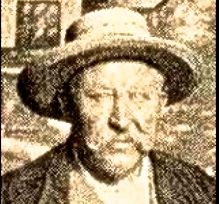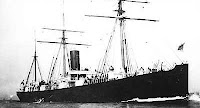“Papa” Starke: The Pied Piper of Gardnerville
“Often at large farm parties, he came prepared with a small hand organ strapped around his shoulders. As he turned the crank, a stuffed monkey popped out of the organ and danced around to the most fantastic music imaginable. Papa led the way much like the pied Piper of Hamlin and, followed by dozens of children, he led the march around the house and every building on the farm, all singing as they marched.” Thus did Frieda Godecke remember H. William “Papa” Starke, a German immigrant saloonkeeper of Gardnerville, Nevada.
 Shown here, Starke was born in Westphalia, Germany, in 1860, the son of Dietrich and Henriette Starke. Little is known of his early life and career, although he likely was trained as a cook and baker. He also married. His wife, recorded as Lina Pferdehirt, and he had one son, William, born in 1887. Then the marriage fractured, perhaps the proximate cause of Starke’s embarking aboard the SteamshipEuropia, below, for America. He arrived in Carson City, Nevada, in 1893.
Shown here, Starke was born in Westphalia, Germany, in 1860, the son of Dietrich and Henriette Starke. Little is known of his early life and career, although he likely was trained as a cook and baker. He also married. His wife, recorded as Lina Pferdehirt, and he had one son, William, born in 1887. Then the marriage fractured, perhaps the proximate cause of Starke’s embarking aboard the SteamshipEuropia, below, for America. He arrived in Carson City, Nevada, in 1893.
 The hand organ, said to be his only possession except the clothes on his back, is reported as the German immigrant’s initial way of making a living. Starke soon gravitated to cooking and baking for local hotels, eventually moving the short 16 miles south from Carson City to the newly established town of Gardnerville. There, assisted by his second wife, Maria Bobysud, an immigrant from then Bohemia, he supplied the residents with baked goods. To augment his income, Starke catered local events and in winter helped area farmers with butchering and sausage making. His stated goal was to earn enough money to own and operate a saloon.
The hand organ, said to be his only possession except the clothes on his back, is reported as the German immigrant’s initial way of making a living. Starke soon gravitated to cooking and baking for local hotels, eventually moving the short 16 miles south from Carson City to the newly established town of Gardnerville. There, assisted by his second wife, Maria Bobysud, an immigrant from then Bohemia, he supplied the residents with baked goods. To augment his income, Starke catered local events and in winter helped area farmers with butchering and sausage making. His stated goal was to earn enough money to own and operate a saloon.
Eventually Starke had accumulated sufficient wealth to build a drinking establishment next to his bakery. It officially was known as the Corner Saloon but popularly as “Papa’s Place.” The business included a restaurant serving meals around the clock and selling beer, wine, liquor and cigars. According to Ms. Godecke, “Papa’s Place” was something set apart from other Gardnerville saloons: “The friendly atmosphere, the welcome grin of Papa, the free pretzels, pumpernickel and liverwurst at one end of the highly polished old bar made it a happy meeting place….” A photo shows Starke standing behind the bar.
 Another attraction was a large colorful parrot that hung in a brass cage from the ceiling. Not only could it intone the traditional “Polly wants a cracker,” the bird possessed a pungent vocabulary of profanity, said to swear equally well in German and English. The act was enjoyed by the men along the bar but said to be embarrassing to their wives. Customers assumed that Polly learned its lingo from listening to Papa, who spoke broken English in a strong German accent, and said sometimes to mix the languages indiscriminately.
Another attraction was a large colorful parrot that hung in a brass cage from the ceiling. Not only could it intone the traditional “Polly wants a cracker,” the bird possessed a pungent vocabulary of profanity, said to swear equally well in German and English. The act was enjoyed by the men along the bar but said to be embarrassing to their wives. Customers assumed that Polly learned its lingo from listening to Papa, who spoke broken English in a strong German accent, and said sometimes to mix the languages indiscriminately.
His lack of facility in English did not alter Starke’s popularity. In 1906 he was coaxed into running for county commissioner. It was a three-person body mainly charged with assuring that muddy roads got gravel and that bridges were strong enough for heavy loads. Ms. Godecke described the scene where Starke and other candidates were seated in a large hall before the electorate: “After listening to lengthy speeches, some of which were very boring, it was Papa’s turn to address the assemblage. He arose with all the dignity he could muster and summed it up in two short sentences: ‘When I get into office, I will do my duty. I am Papa and over there sits Mama.’” He won, served, but declined to run again.
In October 1909, following his term in office, Starke returned to Germany, likely to visit his family and the son he had left behind. When he returned the following year he brought a large nickelodeon, featuring a variety of musical instruments within an elaborate frame of colored glass and a lighted illusion of a waterfall. At five cents a play, the machine delivered a constant stream of German ditties. Whether Starke’s bar tokens, below, were legal tender for music is unclear.
 Starke subsequently moved the nickelodeon into a new location, the Oberon Hotel and Saloon, identified with Starke in an advertisement. He changed the name of the saloon to ”Germania.” The 1910 census found Papa running the saloon and small hotel, and Mama doing the cooking and cleaning with the help of a single chambermaid. Virtually all his roomers were German immigrants working as local carpenters, plumbers, blacksmiths and laborers.
Starke subsequently moved the nickelodeon into a new location, the Oberon Hotel and Saloon, identified with Starke in an advertisement. He changed the name of the saloon to ”Germania.” The 1910 census found Papa running the saloon and small hotel, and Mama doing the cooking and cleaning with the help of a single chambermaid. Virtually all his roomers were German immigrants working as local carpenters, plumbers, blacksmiths and laborers.
In his treatment of Starke, Author Raymond Smith asserts that in the early days of World War I, the Germania saloon became the headquarters of the German residents of the area. He states: “The Bund met regularly, sometimes twice a week, in the back room.” Although sons and perhaps daughters of German descent may have met at Starke’s place, the Bund as a named organization was not formed until 1936 after the rise of Hitler in Germany. Moreover, given the anti-German feelings fostered by the Wilson Administration, it is unlikely that those meeting at Starke’s were advocating treasonous activities as the Bund did. After 1920, the Germania was closed and could not have host the Bund.
In April 1916, Starke moved to expand his saloon operations to another Douglas County community called Centerville. The venture apparently failed and in a matter of months Papa was back in Gardnerville at the Germania and operating the bakery. This period was marked by the arrival of Starke’s son, William, from Germany, possibly avoiding conscription into the Prussian army. Their reunion proved short-lived when William died in 1919. “Mama” Marie, with whom Starke had no children, followed her step-son in 1929.
 Rather than emphasize the sad nature of “Papa” Starke’s end of life, I return to his happier days entertaining the children of Gardnerville. Starke was not a handsome man. He had a stocky round body and a face deeply scared, the result of small pox contracted as a boy. His presence might have been frightening to small children. Such was his kindly disposition and clear love of children, however, that youngsters were attracted to him.
Rather than emphasize the sad nature of “Papa” Starke’s end of life, I return to his happier days entertaining the children of Gardnerville. Starke was not a handsome man. He had a stocky round body and a face deeply scared, the result of small pox contracted as a boy. His presence might have been frightening to small children. Such was his kindly disposition and clear love of children, however, that youngsters were attracted to him.
A concluding comment from Ms. Godecke: “…Children flocked around him as they do around Santa Claus. There was always an expectation that some queer mechanical toy might pop out from one of his many pockets or he might pull a real live rabbit from his sleeve. He loved each and every child.” That is how I will remember Papa Starke, the Pied Piper of saloonkeepers.
Note: This post was gathered primarily from two sources. All the quotations are from a November 11, 1976, article for the Gardnerville newspaper by Frieda C. Godecke, who knew “Papa” when she was a little girl. The article was contained in genealogical material subsequently gathered by descendants. The second source was the“Saloons of (Old — and New) Nevada” by Raymond M. Smith,, 1992. That book provided information on Starke’s career in saloons and several of the illustrations used here.







Hi Jack - Is there a way to email you? I'd love to know more about how you researched Cerruti Mercantile and specifically where you found the Crystal Palace Plunge pamplet - I have yet to find those images anywhere other than your post - would love to chat- email me at courtney at creativebug dot com - many thanks - cc
ReplyDelete